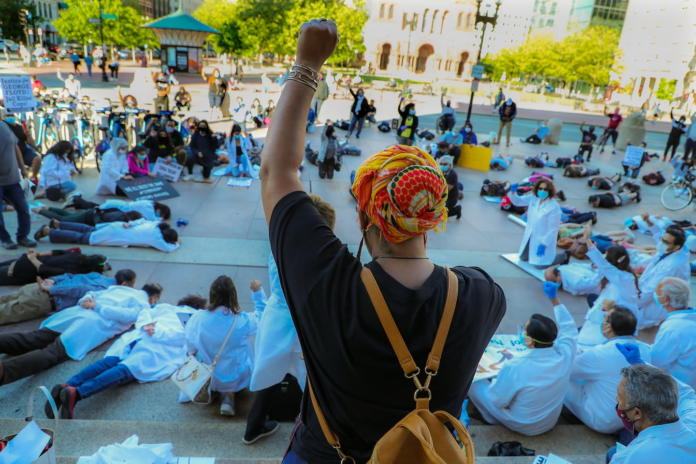These disparate outcomes — coupled with the massive racial uprising following the murder of George Floyd in May 2020 — propelled Massachusetts to lead the country into a new era: The state became a hub for equitable health care research and policy.
The coronavirus pandemic spotlighted health disparities in a way that few had seen before. Everyone seemed to be getting sick, but the severity and risk of death partly depended on race, gender, and location.
But the survival of such work is in jeopardy under the second Trump administration, and some leaders here are concerned that the growing anti-DEI sentiment across the country will not only dismantle the progress made in recent years but also make them political targets.
Dr. Rita Hamad, director of Harvard’s Social Policies for Health Equity Research Center, is concerned about increasing opposition to equity-focused work that could undermine efforts to reduce Boston’s significant health inequalities. Erin Clark/Globe Staff
“The silver lining of the pandemic is we figured out that we really can fix our policies to best help marginalized people‚” said Dr. Rita Hamad, director of the Social Policies for Health Equity Research Center at the Harvard T.H. Chan School of Public Health, or SPHERE. “Despite the things that we learned, we’re rolling all that back.”
As the same racial disparities that drew countless health care reforms persist, the Trump administration is gutting programs designed to study and address inequities. The National Institutes of Health, or NIH, has slashed funding for what could be hundreds of research studies the administration deems as furthering diversity, equity, inclusion, LGBTQ+ issues, and Chinese interests. DOGE and the Department of Education have threatened universities with federal funding cuts if they don’t eradicate ongoing DEI initiatives.
Advertisement
White House spokesperson Kush Desai said the country gave President Trump a directive “to scrap the DEI bureaucracy and mandates that are choke-holding our institutions.”
Advertisement
“Finite resources can’t be spent on advancing vague social goals,” Desai said. They “must be invested in cutting-edge research … to expand our understanding of the universe and apply scientific breakthroughs to elevate our material well-being.”
In response, some local hospitals are removing details on gender-affirming care from their websites to protect patients and staff. Researchers vying for coveted NIH grants are rewriting papers to scrub mentions of DEI, antiracist, or health equity work. Media relations teams once excited to publicize equitable medical breakthroughs are now not as forthcoming: “We do not have anyone for you on this.”
Dr. Bisola Ojikutu, executive director of the Boston Public Health Commission, said the city is resourced enough to weather any budget cuts that could come from Washington, D.C.
“It’s important right now for us to redouble our efforts to addressing health inequities and to think about ways to work together to continue this work,” she said.
BPHC Executive Director Dr. Bisola Ojikutu spoke during a roundtable discussion on antiracism, at the Boston Public Health Commission headquarters on Nov. 3, 2022. Jonathan Wiggs/Globe Staff
But other health leaders said they have already been stuck by federal cuts.
Ariel Beccia, an epidemiology instructor at the Chan School of Public Health, has been studying the pandemic’s impact on sexual minorities’ mental health through NIH. The last third of her roughly $228,000 in grants was terminated by the Trump administration.
“If we don’t have information on a given community, how are we supposed to be doing more inclusive and effective public health work to address the needs of these communities?” Beccia said.
Amid the widely publicized attacks on antiracist health care, some leaders, such as Dr. Nahid Bhadelia, founding director of Boston University’s Center on Emerging Infectious Diseases, worry the public will forget a key outcome of COVID-19: The resulting surge of equity-centered policies didn’t just benefit people at the margins; it helped everyone.
Advertisement
“Protecting them protects us,” Bhadelia said.
Masks were offered to a driver at the intersection of Talbot and Blue Hill avenues in Dorchester on Jan. 28, 2021. Craig F. Walker/Globe Staff
Greater Boston still has wide health disparities. According to the most recent data, there is a 23-year life expectancy gap between Boston’s heavily white Back Bay and the majority Black Roxbury neighborhoods. Black, Latino, Indigenous, and Pacific Islander communities are still afflicted by higher rates of diabetes, hypertension, and COVID-related deaths. Disabled people and LGBTQ+ communities still face momentous barriers to accessing adequate care, making mental health crises and health scares more dire.
These gaps aren’t new. For decades, events that laid bare Boston inequalities — such as court-mandated busing and the infamous Charles Stuart murder case — have captured health organizations’ attention.
Some people have always known about these disparities, largely because they are living it. “This is just who we are,” said Gladys Vega of La Colaborativa, a Chelsea-based social services organization that overnight became a one-stop shop for food, housing, health care, and immigration needs during the pandemic.
Residents waited for consultation at La Colaborativa in Chelsea on March 16, 2021. Craig F. Walker/Globe Staff
As coronavirus reached Massachusetts, misinformation about who could and couldn’t get sick spread. Black people were somehow immune, and people of East Asian descent were vilified as vectors for coronavirus. These myths quickly fell apart as more people got sick.
“COVID was rather unique,” said Alexandre White, a professor at Johns Hopkins University in Baltimore who studies the intersection of race and medicine. “COVID affected everyone, but it didn’t affect everyone equally.”
Advertisement
The number of infections grew, and Black, Latino, Indigenous, and Pacific Islander residents were hardest hit. Between 2020 and 2022, Hispanic and Black adults in Massachusetts died at higher rates than white people, according to a Globe-commissioned analysis of CDC data by BU’s School of Public Health.
Then Floyd’s murder by police in Minneapolis made calls for social change more urgent. Politicians proclaimed racism a public health emergency. Health care leaders brought life-saving technologies to the hardest hit communities’ doorsteps. The moment seemed to prove equity-informed policy was not only possible, but also sustainable.
“We were watching civil rights in action,” said Robert Lewis Jr., president and CEO of Boys & Girls Clubs of Boston.
Robert Lewis donned a mask while working with state Representative Chynah Tyler, distributing face masks to commuters at Nubian Station in Roxbury on April 29, 2020. Craig F. Walker/Globe Staff
Amid this universal call to action, Dr. Apurv Soni, director of digital medicine at UMass Chan Medical School in Worcester, used his med school experiences treating patients in rural India to design Home Test to Treat, an at-home COVID treatment program introduced in 2023 for vulnerable Americans with limited health care access.
“How do we meet patients and people where they are, and how do we get information securely into an environment where we can learn from it,” Soni said.
The universal shift toward equity also meant access to life-saving data.
Raquel Halsey, executive director of the North American Indian Center of Boston, said her organization needed COVID-19 infection and death data to apply for grants that could address the pandemic’s havoc on Indigenous residents.
A medical worker in Boston walked past a City of Boston COVID-19 sign on Stuart Street and a Black Lives Matter sign in June 2020. John Tlumacki/Globe Staff
The problem: Most datasets, including the state’s COVID-19 dashboard, lumped Native infections and deaths into the “other” demographic. The state in 2020 recruited Halsey into its COVID-19 health equity advisory group, and placed Indigenous residents in a separate category for future community impact surveys.
Advertisement
“It’s one of those quiet victories,” she said.
Other changes received more noise. The shift toward equity-centered care put the spotlight on leaders who have been advocating on these issues for years, and right-wing thinkers swooped in. Perhaps most notable were white supremacists’ attacks on Brigham & Women’s, where two of the hospital’s doctors who published an antiracist health care agenda in 2021 were targeted, doxxed, and harassed.
“We had to do personal safety plans, I’d have a security escort for a while,” said Dr. Michelle Morse, one of the targeted doctors who is now New York City’s chief medical office. “Ultimately, we were able to just keep the work going.”
Brigham and Women’s Hospital community gathered on the lawn of the hospital as they held a banner in response to the protest against the hospital’s antiracists efforts on Feb. 17, 2022. John Tlumacki/Globe Staff
Then the masks went away, the test kits collected dust, and the cries for diversity, equity, and inclusion softened.
In recent weeks, the Trump administration scrubbed race-related, LGBTQ+, and other demographic data from public websites, reverting back in some ways to a pre-pandemic time. It has made executive orders aimed at rolling back civil rights protections.
Morse said she isn’t spammed with the hateful texts, emails, and social media comments she once was for her antiracist research. But with current events, “it feels like it’s just going to be a matter of time.”
The deadly coronavirus is also still front of mind for researchers such as Beccia, the Chan School epidemiologist who has been studying the pandemic’s effects on sexual minorities’ mental health for years.
Research into marginalized groups is already underfunded, she said. Now, “we’re going to go even more past that.”
Beccia said she worries about the student researchers who will come behind her. NIH funding doesn’t just cover research. It ensures student researchers can meet their basic needs, that students studying health disparities have the resources they need, she said.
Advertisement
She pointed to dozens of grants that have been wiped from NIH’s website. If the government continues terminating DEI-related funding, she said, “we are really going to be losing a generation of scientists.”
Health care workers at Boston Medical Center held an 8-minute, 46-second moment of silence in memory of George Floyd and other members of the Black and brown community who have lost their lives to police violence in 2020. Jessica Rinaldi/Globe Staff
Tiana Woodard can be reached at tiana.woodard@globe.com. Follow her @tianarochon.





